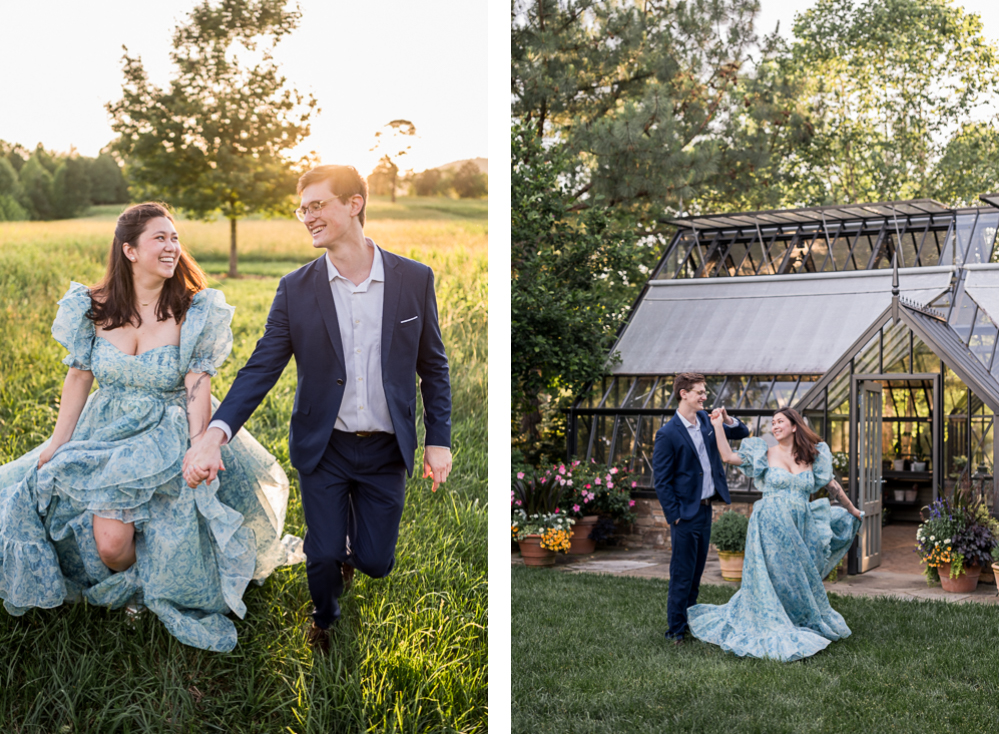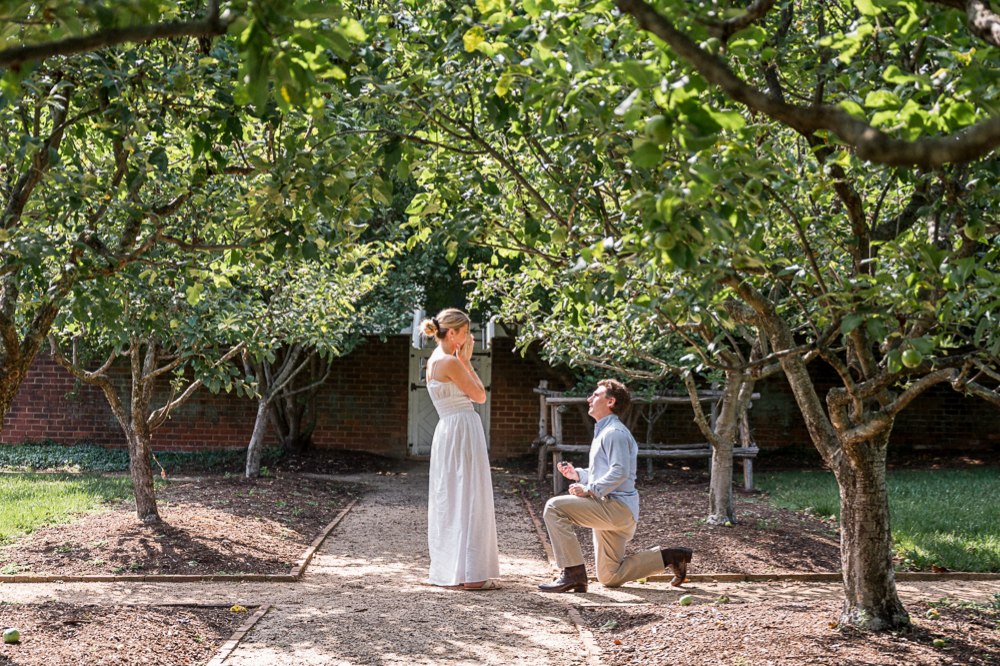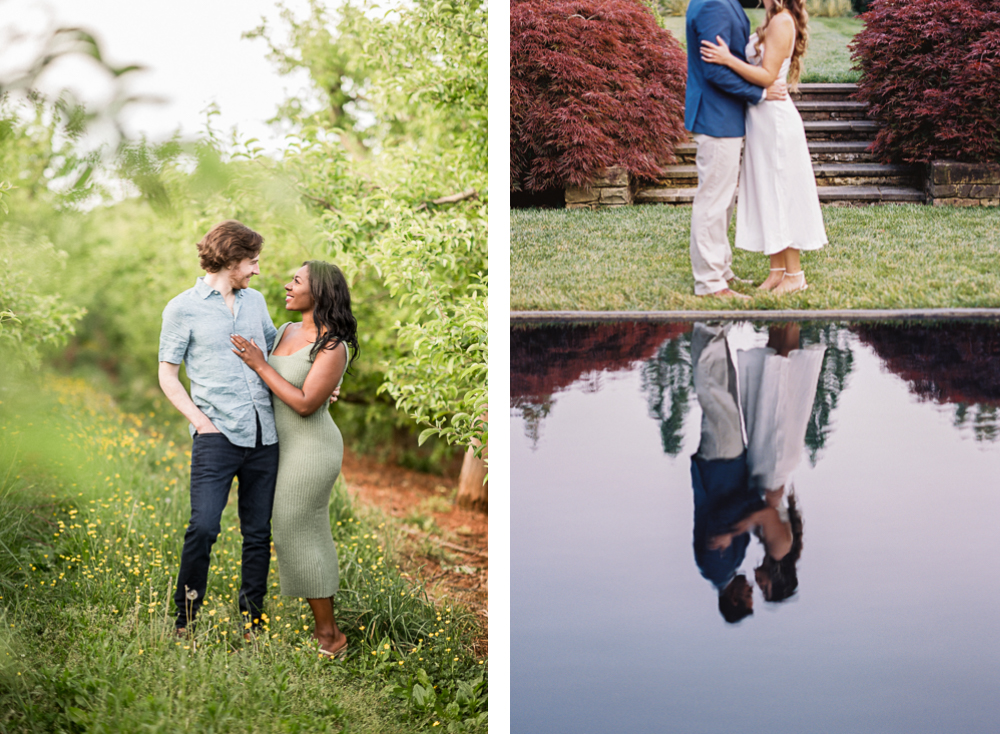VIEW BY CATEGORY:
Hi, we're Hunter and Sarah, a husband-and-wife, luxury wedding photography team. We’re also educators, helping other photographers build profitable and sustainable photography businesses.
MEET US
LOOKING FOR SOMETHING?

How to Propose Part 1: “Should I Get Engaged?”
August 6, 2024
Over the years, Sarah and I have had the joy of photographing more than 60 surprise proposals. It’s been our privilege to watch our clients ask a single question that changes the course of their lives! Between that and my own experience of proposing to Sarah, we’ve learned a lot. Now, it’s our turn to pass along our experience and wisdom! This is the blog series to everyone wondering, “How do I propose to my partner?” But today, we’re taking a step back and asking a more important question. “Should I get engaged?” “Am I ready to propose to my partner?”
Full disclosure: this entire series (but especially today’s post) is written as a note directly from me, Hunter, to everyone out there who’s exactly where I was back in 2016: head over heels in love, with absolutely no idea how to ask Sarah to marry me! And in Part 4, Sarah will chime in with some of her input to anyone who thinks the big question might be coming soon!
Much of this blog series will be filled with heartfelt engagement stories, and tons of tips and tricks for proposing. However, this week we need to ask some serious questions. Although these might seem like overkill right now (you’re ~IN LOVE~ after all!), it’s much better to ask yourself these questions now rather than 6 months into engagement, or 6 years into marriage!

“So… Should I Get Engaged?”
Sarah and I were the first to get engaged and married among all our close friends from both high school and college. So between our friends and family, and all the young people that Sarah and I have mentored through our church community… we’ve heard this question quite a few times. And when someone asks us, “Should I get engaged?” our conversation typically follows something like these four questions.
And even though we know there’s way more to think about than just these four questions, we also know that they are a way to help people think more seriously through this huge decision. My greatest fear would be that a someone we know proposes to their partner not because they’re ready to commit their lives to one another, but because it’s just “the next thing to do”.

“Should I Get Engaged?” Question #1 How long have you felt this way about them?
We’ve all had friends who do an emotional zero-to-one-hundred just a few weeks or even days into a new relationship. It’s one of those strange occurrences that is so easily recognized by outside observers, but is imperceptible to the two love-birds. It’s often called “the honeymoon phase”, and it’s dangerous to make decisions with life-long implications when you’re in it.
Now you may have heard stories (like we have) of a two people who — on their first date — know that they’re meant to be together and are basically engaged from that point until their very-soon-after wedding. And sometimes, they go on to be happily married for decades after! While these stories are awesome and certainly aren’t to be discounted, I’m fairly confident that that’s the exception, not the rule.
Usually, it seems that it can take anywhere between a couple of months and a year to get past this “honeymoon phase” and into what lies beyond. In the honeymoon phase, your partner can do no wrong. During this phase, both parties feel madly, overwhelmingly in love. You know when you’re around people like this, because they are just so into each other. But usually, two people in this phase of a relationship are actually in love with the idea of each other. This is usually not the time to be asking if they should get engaged.

Past the Honeymoon Phase
It’s only past the honeymoon phase that you begin to realize that your partner is not, in fact, the crowning achievement of humanity. Instead, you begin to understand them as a normal human being with their own faults. Only then can real love actually begin to grow! Past the honeymoon phase, you actually begin to know and love a person, rather than just the idea of a person. When you begin to realize that this person actually has flaws and shortcomings and isn’t a perfect human, and you love them in spite of that — well that’s when the real magic happens.
If you think you might still be in this honeymoon phase, now is not the time to ask, “Should I get engaged?” If you’ve never had an argument or even a disagreement about anything… Or if your favorite thing to do together is sit cross-legged on the floor facing each other and staring deeply into each other’s eyes… Or if you cannot possibly imagine a scenario when this person does anything wrong… Then you might still be in the honeymoon phase. And if you are, that’s totally okay! Enjoy this time! But you may want to keep pressing on and get to know each other better with time. That way, you know who it is that you’re actually committing to.

“Should I Get Engaged?” Question 2: Does this make sense for your current stage of life?
Now I know that you’re thinking: “Hunter, love can’t be confined by things like finances or geography or our stage of life! Our love transcends those things!” And you may be totally right! Love is able to reach across hurdles and boundaries of all kinds. But in certain stages of life, it can actually benefit your relationship — both in the present and in the future — if you hold off on getting engaged.
For example, if you’re both college students who attend different colleges in different cities or states, how will this work, practically? Will you be engaged until one or both of you graduate, then move to the same town? Is that a year away, or still seven semesters away? Because one will mean a lot of long drives for a year while you plan a wedding, while the other means you’ll either be living in different towns during your first years of marriage (certainly not ideal), have a 3+ year long engagement (also not recommended), or one of you will have to transfer schools (and you’re not allowed to just assume it won’t be you).
I decided that I was going to marry Sarah in October of my sophomore year of college. But we went to different schools that we both loved, so I knew that it would be several years before we could get married and live in the same town. So I used that time to begin saving for a ring, and we continued to grow in our relationship. I waited until things made more sense, and all the while developed better communication and time-management skills, since long-distance forced us to be good at those things. This is obviously just our experience, but it’s hopefully a useful example of when waiting might make more sense.

“Should I Get Engaged?” Question 3: Will it be financially responsible?
Next week we’ll be talking more about buying an engagement ring. But here’s a quick spoiler: it doesn’t have to cost thousands of dollars! But we know that some people do want to spend a hefty sum on a ring. And others know that their partner might be expecting it. So if you currently have $13 to your name, maybe now isn’t the best time. 😂
While an engagement ring is something that our culture deems important to a traditional proposal and marriage, that doesn’t mean that it has actual importance. Not to everyone, at least. In my opinion, it’s certainly not worth going into debt over. After all, beginning a marriage on debt can set a precedent that can lead to colossal problems down the road. Maybe it’s better to forgo a big expensive ring, or spend some more time saving up for one.
There are also, of course, questions of how the two of you will provide for your new family of two once you’re married. Although every situation is different, just pause and consider what the marriage of your finances would look like too!

“Should I Get Engaged?” Question 4: Are you ready to commit to this person for the rest of your life?
Sarah and I take marriage seriously. We believe that it’s a different type of relationship than any other in our lives on earth. That’s why question 4 is the most important question to ask.
In business, we enter into contractual relationships; we exchange goods and services for other goods and services. When you sign a lease with your landlord, you’re signing a contract. They give you housing, and in exchange you give them rent. If they kick you out without warning, or you stopped paying them rent, then one of you has broken the contract. Therefore, you both call the contract null and void, and move on.
In contrast, we believe that marriage is not fundamentally a contractual relationship. It is not at its core an exchange of good and services, but is actually so much more than that.

Marriage as Covenant
Sarah and I believe that marriage is a covenant relationship. And marriage as a covenant is fundamentally different from marriage as a contract. A marriage covenant says that we are both in it for the long haul, no matter what happens. On the other hand, a marriage contract says I’m comitted so long as the other person provides what I need.
Marriage as a covenant pledges lifelong faithfulness and promises to do whatever is necessary to uphold and protect the marriage. Marriage as a contract pledges faithfulness as long as the other party is fulfilling its end of the bargain. In short, a marriage covenant is life-long and nearly unbreakable. But a marriage contract is only in place so long as both parties find it mutually beneficial. A marriage contract is broken as soon as both people (or more typically one person) doesn’t feel that their needs are being met anymore.
Before you get down on one knee, ask yourself: are you ready to make a commitment like this? Are you ready to commit for life?

Wow, that was pretty heavy stuff. All you asked was, “Should I get engaged?”
Yeah, we know. But Sarah and I know something else, too. It’s so much easier to not get engaged in the first place than it is to call off an engagement. Or even worse, to go through the traumatic process of divorce. Marriage is important to Sarah and I. We believe it’s also important to the flourishing of families, cultures and societies. So e want to do everything we can to make sure that people aren’t entering into it flippantly or lightly!
But anyway, we know that you came to this blog to find fun tips on planning a great proposal! 😂 The future segments will definitely have a ton of that! So use the links below to check out more of the fun stuff!
—
Check out the rest of the series at the links below!
- How to Propose Part 1: “Should I get engaged?”
- How to Propose Part 2: How to pick the right engagement ring
- How to Propose Part 3: “When should I propose?”
- How to Propose Part 4: “When will he propose?”
- How to Propose Part 5: Where to propose (in Charlottesville)
- How to Propose Part 6: How to Propose to Your Girlfriend/Partner
- How to Propose Part 7: How to Plan a Proposal Weekend in Charlottesville
—
Filed in:
Wedding Photography & Photography Education
Charlottesville, Virginia and Beyond
HOME
ABOUT US
WEDDINGS
JOURNAL
FOR PHOTOGRAPHERS
PRESS & PRAISE
BLOG
CONTACT
e. hunter@hunterandsarahphotography.com
p. (434) 260-0902